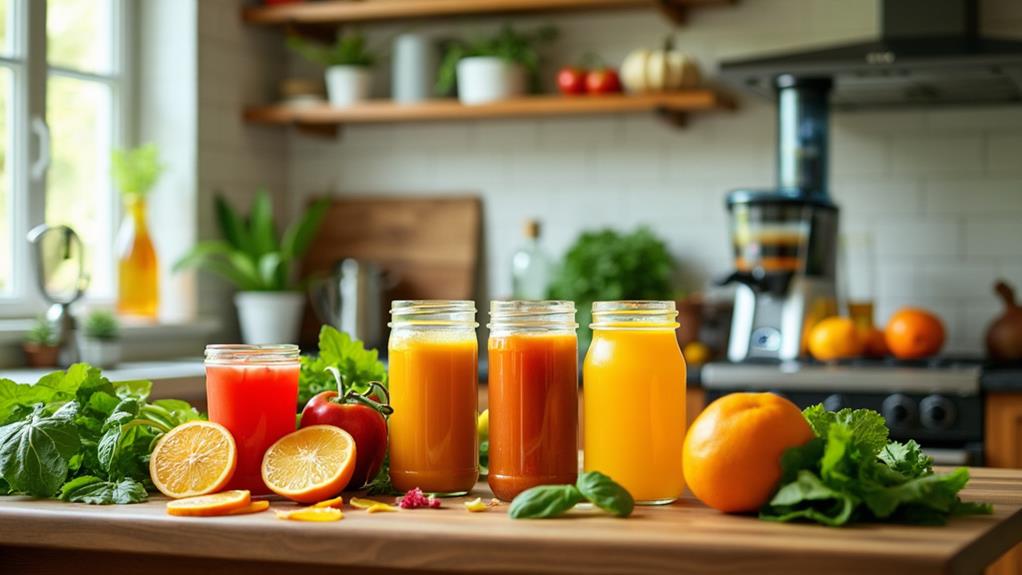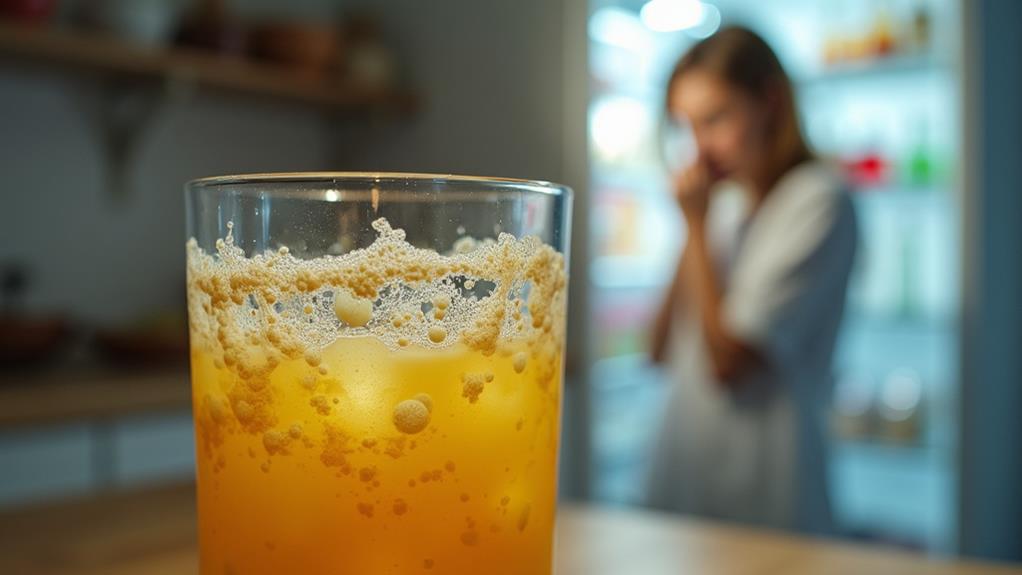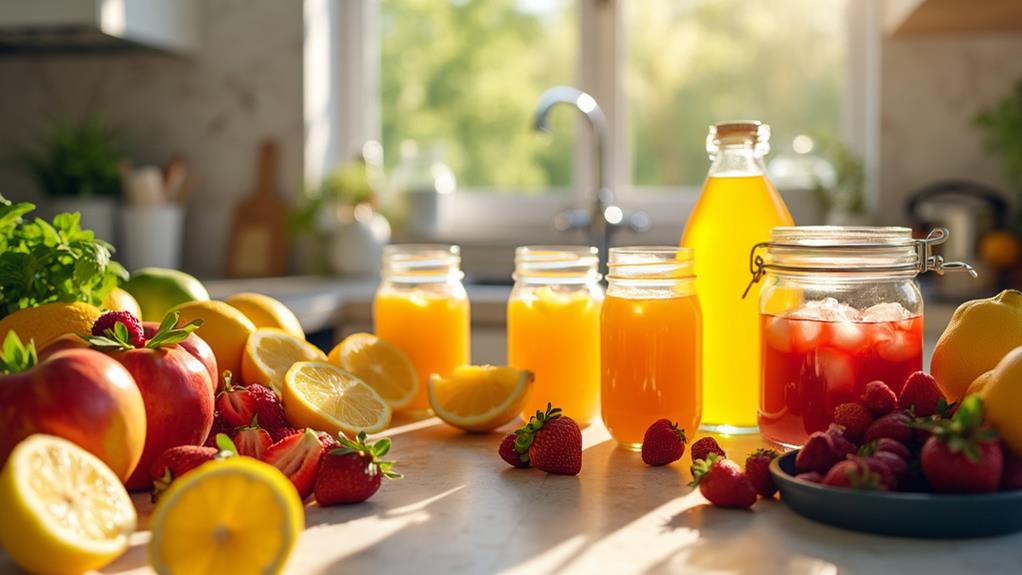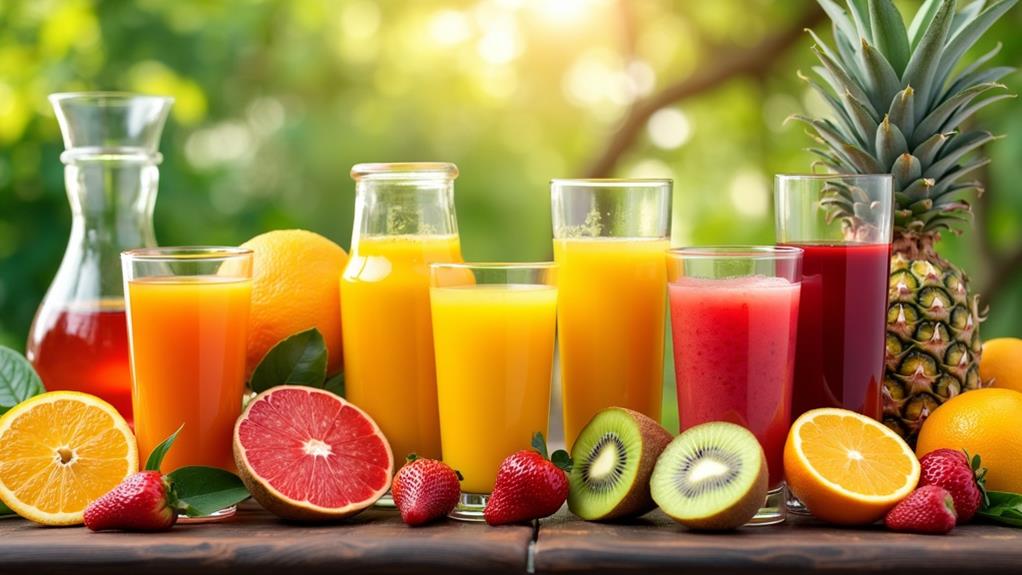Understanding the Difference Between Cold-Pressed and Regular Juice
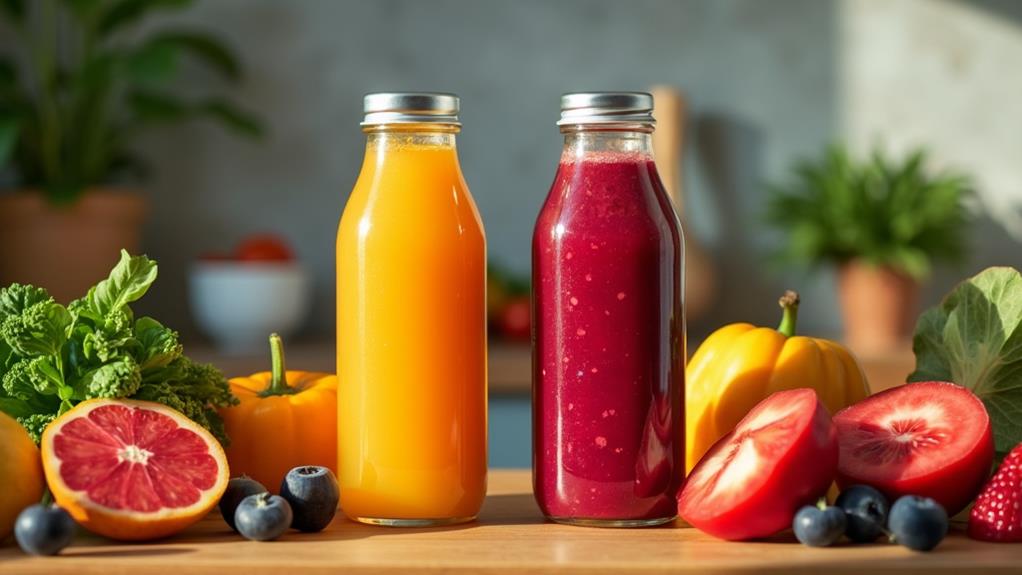
When you choose cold-pressed juice, you're opting for a beverage that preserves up to 30% more vitamins and antioxidants than regular juice. The process involves using a hydraulic press, avoiding heat to maintain nutrients and flavors. Regular juices, on the other hand, use centrifugal juicers that generate heat, degrading nutritional value and taste. Cold-pressed juices boast richer flavors, while regular juices might contain added sugars. The benefits of cold-pressed include better nutrient retention and fewer additives, making them ideal for health-conscious individuals. If you're curious about how these differences impact health and taste, you'll uncover more insights ahead.
Cold-Pressed Juicing Explained
Cold-pressed juicing offers a fresh take on extracting juice, using a hydraulic press that preserves up to 30% more vitamins and antioxidants compared to regular methods. This groundbreaking juicing process guarantees you're getting the maximum nutritional value from every sip. By avoiding heat, which can degrade vital nutrients, you retain the lively colors and natural flavors of the fruits and vegetables. It's not just about taste, though; it's about delivering a nutrient-dense beverage that supports your comprehensive health.
In the cold-pressed juice process, the expedition begins with a detailed inspection of the produce. Only the highest quality ingredients make it through, guaranteeing that your juice is as fresh and flavorful as possible. The pressing stage follows, where the hydraulic press extracts juice without introducing heat. This method can pack up to 2-4 pounds of raw produce into a single bottle, making it a powerhouse of nutrition.
To guarantee safety and extend the shelf life without compromising nutritional value, High Pressure Processing (HPP) is often used. This technique preserves the integrity and freshness of the juice, allowing you to enjoy its benefits longer. Cold-pressed juice is a commitment to quality and health.
Regular Juicing Process
While cold-pressed juicing emphasizes preserving nutrients, the regular juicing process often sacrifices these benefits for speed and efficiency. Regular juice production typically uses centrifugal juicers, which are equipped with sharp blades that rapidly pulverize fruits and vegetables. This process generates heat, compromising the flavor and nutritional value of the juice. The high-speed spinning in centrifugal juicers also leads to significant oxidation of nutrients, further degrading the quality of your juice.
In addition, regular juices are often pasteurized for safety, which involves heating them to over 100°F. This step, while necessary for shelf stability, further diminishes both the flavor and the nutrient content. To compensate for these losses and appeal to a broader audience, many regular juices contain added sugars, artificial sweeteners, and preservatives. These supplements improve flavor and extend shelf life but can mask the natural taste of the ingredients you're expecting to enjoy.
Ultimately, the production process for regular juice is faster and more cost-effective than cold-pressed methods. This efficiency results in lower prices for consumers, but it comes at the expense of taste and nutritional integrity. When choosing your juice, consider what matters most to you: speed and cost, or flavor and nutrition.
Nutritional Differences
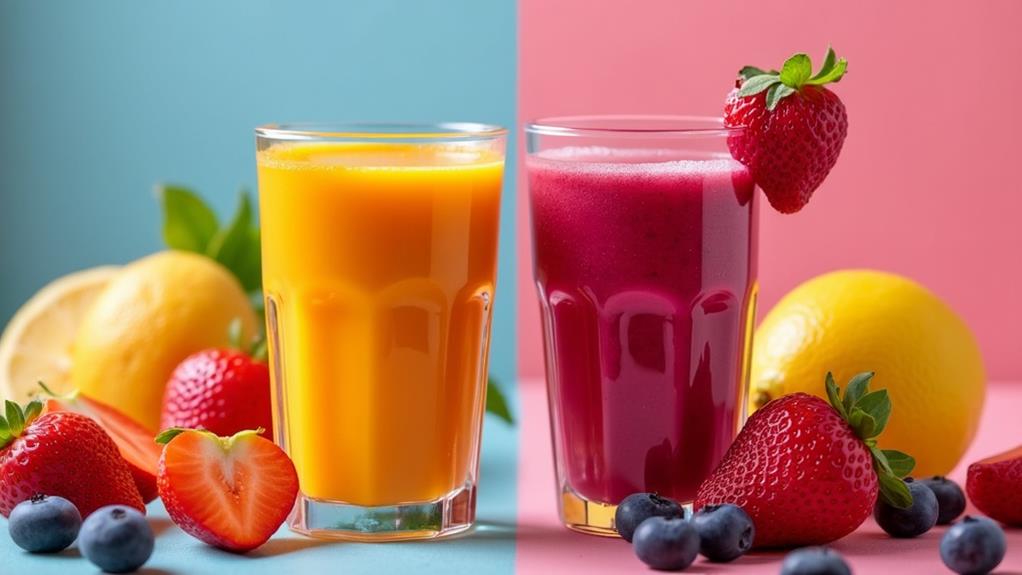
Plunge into the world of nutritional differences between cold-pressed and regular juices, and you'll uncover striking contrasts. Cold-pressed juices, crafted with minimal heat, retain about 30% more vitamin C than regular juices. This preservation occurs because cold-pressed methods avoid the nutrient loss typical of pasteurization, which regular juices undergo. As a result, regular juices often have considerably lower levels of vital vitamins like A, C, and E.
Cold-pressed juices also boast higher antioxidant levels. These antioxidants deliver improved health benefits and promote general wellness by fighting free radicals in your body. With each bottle containing 2-4 pounds of raw produce, cold-pressed juices pack a powerful nutrient punch. In contrast, regular juices may include added sugars and sweeteners, diluting their nutritional value.
An often-overlooked advantage of cold-pressed juices is their preservation of digestive enzymes, which support gut health. Regular juices, subjected to heat processing, may lack these beneficial components. So, when you choose cold-pressed over regular juices, you're opting for a nutrient-dense, health-boosting beverage that supports your well-being on multiple levels. Regardless of you're seeking vitamins, antioxidants, or digestive benefits, cold-pressed juices stand out as the superior choice.
Flavor and Taste Comparison
In relation to flavor and taste, cold-pressed juices offer a lively and invigorating profile that's hard to beat. Their vivid and rejuvenating taste comes from the minimal heat exposure during extraction, which preserves the natural flavors of the ingredients. You'll notice that cold-pressed juices have a richer and more nuanced flavor profile compared to regular juices. This is largely because they're crafted from high-quality, fresh produce without artificial flavors or sugars, allowing the true essence of fruits and vegetables to shine through.
On the other hand, regular juices often undergo heat processing, which can dull their flavor. The incorporation of sweeteners is common in regular juices, masking the natural taste of the fruits and vegetables. Cold-pressed juices can contain up to 2-4 pounds of raw produce per bottle, delivering a more robust flavor experience. This contrasts starkly with regular juices, which often have a lower fruit content.
When you compare similar juice flavors, the taste differences are unmistakable. Cold-pressed varieties maintain a fresh, authentic taste often absent in regular juices due to nutrient degradation. This fresh taste can make all the difference when savoring your beverage.
Health Benefits Overview
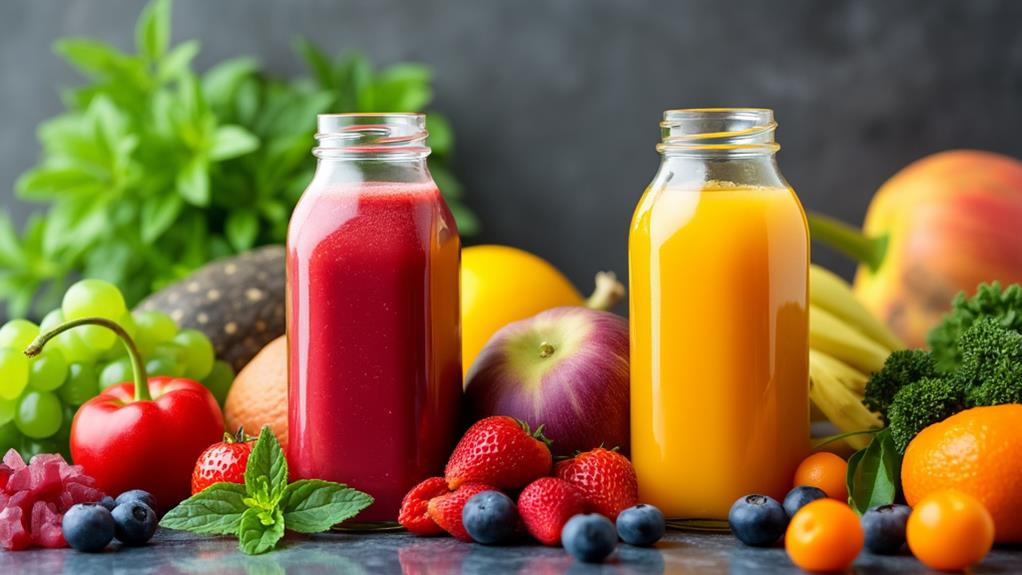
Cold-pressed juices pack a powerful punch regarding health benefits. When you compare cold pressed juice vs regular juice, you'll find that cold-pressed varieties retain 30% more vitamin C and showcase higher nutritional levels of antioxidants. This means they can considerably strengthen your immune system and promote comprehensive health. The secret lies in the minimal heat exposure during the juicing process, which preserves enzyme activity. These enzymes aid digestion and improve nutrient absorption, making your body more efficient in processing the goodness packed into each glass.
Moreover, cold-pressed juices typically contain less sugar than their regular counterparts. This not only helps satisfy your sweet tooth but also reduces the risk of sugar-related health issues like diabetes and obesity. Regular juice often loses crucial nutrients during pasteurization, increasing the chance of nutrient deficiencies if used as a primary beverage. In contrast, cold-pressed juices maintain their nutritional integrity.
Environmental Impact
When you choose cold-pressed juice, you're not just making a healthier choice for yourself but also for the planet. The cold pressing method greatly reduces the environmental impact compared to traditional juice production. Here's how:
- Upcycled Ingredients: Cold-pressed juice production utilizes upcycled fruits and vegetables, which helps reduce food waste and promotes sustainability. By using produce that might otherwise be discarded, you're supporting a more efficient food system.
- Lower Energy Consumption: The cold pressing process requires less energy and resources. Unlike traditional methods that involve heat pasteurization and extensive processing, cold pressing minimizes energy use, making it a more eco-friendly option.
- Nutrient Preservation: By keeping the juice extraction process free from heat, cold-pressed juices preserve more nutrients. This not only benefits your health but also reduces the environmental footprint related to nutrient loss and waste.
- Eco-Friendly Practices: Many cold-pressed juice companies engage in sustainable practices, like biodegradable packaging and supporting local farmers. These efforts further improve their positive environmental impact, making your choice even more beneficial for the planet.
Consumer Preferences
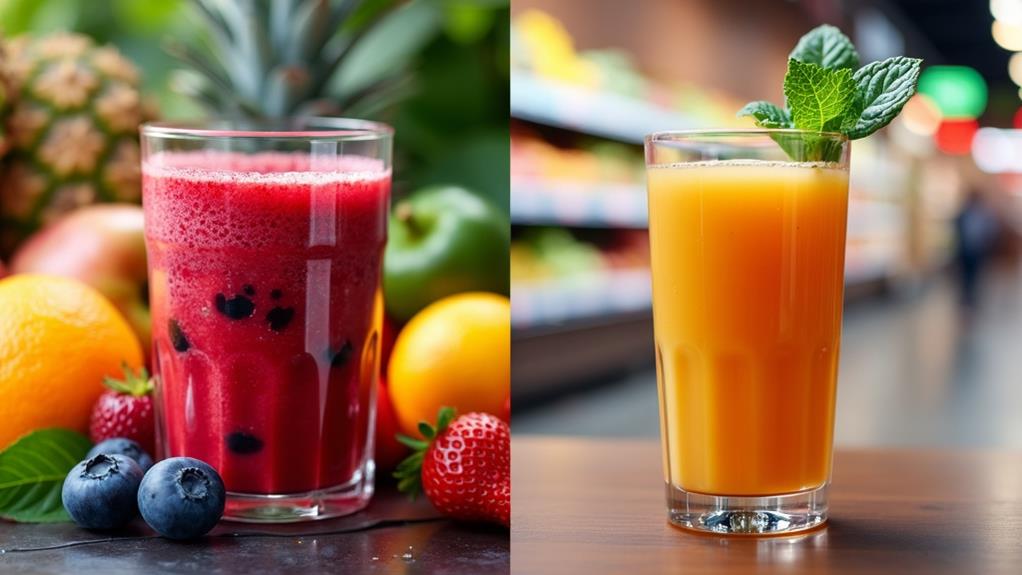
Many health-conscious consumers are increasingly gravitating towards cold-pressed juice, drawn by its superior health benefits and lively taste. You're not alone if you find yourself reaching for these colorful bottles instead of the regular options. The demand for cold-pressed juice is climbing, with many people noting its fresher taste and more intense flavor than what's typically found in regular juices. These qualities greatly influence consumer preferences, since they align with a desire for nutritious and delicious beverage choices.
However, you might also notice that cold-pressed juices come with a higher price tag. This is due to the quality of ingredients and the unique production methods involved. While this might make you think twice, the benefits often justify the cost for those prioritizing health and flavor. Moreover, the growing availability of cold-pressed juices in supermarkets and health food stores makes it easier than ever to choose these healthier alternatives.
Social media also plays a role in shaping consumer preferences. You might find yourself inspired by posts highlighting the nutritional advantages and appealing flavors of cold-pressed juices, making them even more enticing. Consequently, consumer preferences are steadily shifting towards these cold-pressed options.
Market Trends and Growth
Ever wondered why cold-pressed juice is gaining so much traction lately? The market is thriving, with projections showing significant growth by 2025. This surge is mainly driven by an increase in consumer awareness of the health benefits associated with these juices. As more people shift towards health-conscious options, cold-pressed juices are carving out a larger slice of the juice market pie. They're gaining popularity over regular juices, which still dominate 90-95% of the market but are losing ground as preferences evolve.
Social media has played a crucial role in this trend. Platforms like Instagram and TikTok have helped elevate the demand and visibility of cold-pressed juices. Here's how:
- Rising consumer awareness: People are more informed about the nutritional benefits of cold-pressed juices.
- Innovations in technology: New juicing tech is making these juices more accessible.
- Focus on ingredients: There's a growing emphasis on organic, locally sourced produce.
- Enhanced retail presence: More supermarkets and health food stores now stock these premium products.
These factors contribute to the expanding market presence of cold-pressed juices, making them a top choice for the health-conscious consumer.

